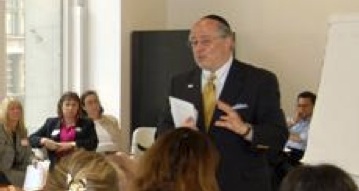News
Touro College’s Graduate School of Social Work To Offer New Master’s Course on Counseling Survivors of Trauma
“Clinical Social Work Practice with Survivors of Trauma" Teaches Appropriate Responses for Affected Children, Adolescents, Adults and Families

New York, N.Y. - Dr. Steven Huberman, dean of the Touro College Graduate School of Social Work, has announced a new course offering this fall designed to teach social workers how to counsel victims of trauma.
Titled “Clinical Social Work Practice with Survivors of Trauma,” the course is directed at master’s level social work students, seeking to introduce them to a full spectrum of post- traumatic disorders and teaching them appropriate responses for affected children, adolescents, adults and families.
Instructor Melissa Earle, LCSW-R, an adjunct professor at the Graduate School of Social Work, explained that a pilot version of the course offered in 2009 was so successful that it was decided to add it to the curriculum.
“Dealing with traumatic events has always been a cornerstone of social work,” Ms. Earle said. “Today we have veterans returning home from Iraq and Afghanistan, but we also have more children and families on the receiving end of social services and more homeless families with children. In addition, drug or alcohol abuse--along with mental illness--frequently occurs in conjunction with traumatic events.”
Homelessness is a risk factor for trauma, she explained, since homeless families have lost access to most of the safety nets on which they relied. “Homeless children are exposed to more people from outside the family unit, thereby creating more opportunities for abuse,” Earle said.
In addition to war, traumatic experiences can include exposure to domestic violence, child abuse, and sexual abuse. “Social workers need to feel comfortable asking questions when dealing with survivors of trauma,” she said. “They also need to be asking the right questions. This course will teach them to do so.”
Students in the course will also learn about the influence of gender, culture, and class on post- traumatic response. “Men and women react differently to trauma,” Earle said. “Men become more hypervigilant and angry, while women are more apt to internalize their emotions. In addition, women and men typically experience different types of traumatic events. Women are more likely to have been sexually molested, while men are more apt to have been victims of non- sexual attacks or to have been in positions where they have had to save their own lives.”
Media Contact
Barbara Franklin
Director of Communications
212-463-0400 x5530
Barbara.franklin@touro.edu

